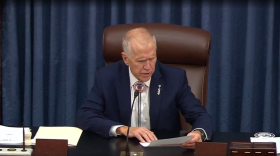It seems like a long time ago, but it’s really been just seven months since newly-inaugurated Governor Pat McCrory sounded this hopeful tone:
“North Carolina’s greatest strength and asset remains its people,” he said during his inauguration speech.
“On those main streets across this state, it’s the people that count and that make a difference. People will come from different backgrounds but share a common set of principles. Self-starters and hard workers.”
Well, those people did come, but maybe not in the way the Governor intended.
This session will likely best be remembered for the 12 Mondays in the spring and summer of 2013, when thousands gathered to protest the actions of the General Assembly. Nearly a thousand offered themselves up to be arrested.
Not since the Civil Rights Era had the Capitol seen such discord. And the Legislature earned North Carolina some unwanted national attention from the New York Times Editorial Board, MSNBC, and other outlets.
None of the name-calling or mocking really mattered to the Republican majority inside the General Assembly. Fresh off overwhelming victories in elections this past fall, they arrived in Raleigh and quickly got to work doing the job they were sent here to do.
They cut unemployment benefits for 70,000 people and reformed health care, taxes and, in the waning hours of the session, voting and abortion. They also passed a balanced budget.
There were a few odd diversions. Nipplegate. Sharia Law. A bill that sought a resolution claiming the First Amendment of the Constitution didn’t apply to the states.
But that’s not what will be remembered by some of those folks McCrory called “hard-workers and self-starters.”
“The cost of living has gone up in the last several years and I’ve had to work two jobs,” said Rose Ann Throckmorton, a fourth-grade teacher from Rural Hall.
“I’ve had to work two part-time jobs and a full-time job and carry the weight of 18 hours going to school and the demands of everything that’s coming at us. They keep putting more and more on our plate, but they don’t give us anything back.”
Arguably the two most significant and broad pieces of legislation – the ones that will have the greatest impact on the daily lives of every North Carolinian - are tax reform and the budget.
The $500 million tax cut was a sweeping, resounding victory for Republicans; one that earned its own signing ceremony in an ornate room of the Governor’s mansion. Flanked by Republican leaders Thom Tillis and Phil Berger and his own budget director Art Pope, McCrory said the tax reform would help bring jobs to the middle class.
“I’m proud that this is not only going to help individuals and individual families, but this is going to help recruit new businesses,” he said. “We stated this when we made the announcement. The Secretary of Commerce said this is going to be a major difference in trying to compete not just against our neighboring states but against the rest of the world.”
The tax-bill signing came the same day the Legislature, a block down Jones Street, passed the budget. It was hailed by Republican leaders as fiscally sound. They say rising Medicaid costs hampered what they could do for teachers.
“We ended up with a half-billion dollar surprise in this year’s budget that all of us were going into this process hopeful that we would appropriate some of that for a pay increase,” said Tillis. “It’s why we tried to at least send a positive message by giving five days of additional vacation to show them that we are concerned with them.”
With less revenue from taxes and the Medicaid hole to fill, budget writers saw no choice but to cut thousands of teacher assistant jobs and eliminate the salary increase for teachers who earn an advanced degree.
It takes a lot to knock such a budget off the front pages, but the surprise introduction of a bill that requires a voter ID and shortens early voting did just that. National voting-rights advocates called it the most sweeping election bill introduced in any state this year.
“And you’re just going to make it more difficult for voters to get to the polls - disenfranchise children to where they can’t vote and that way they can’t vote you out of office,” said Martin Nesbitt, the Democratic Minority Leader. “Let me tell you something: they know what you’re doing. They’re angry. And they’re coming for you.”
If Republicans are worried, they don’t appear so as the Legislature comes to a close. Most will return home to safe districts they re-drew three years ago - and a State Appeals Court upheld earlier this month.
But it is true that all eyes are turning to the next election season. For Tillis and maybe Berger, that means a U.S. Senate campaign.
For the Governor, it means selling the laws that were just passed. Selling them to those “self-starters and hard-workers” from Main Street North Carolina, many of whom voted for him, some of whom did not.
Because even though he didn’t cast a vote in this year’s General Assembly, he is expected to sign all of them, and they will undoubtedly become part of his legacy.







